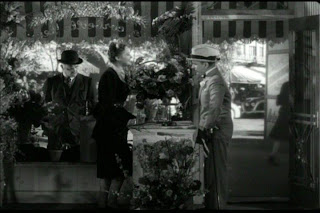
Orson Welles was another filmmaker who wanted to take a crack at the Landru story. He had written a script with the intention of having Charles Chaplin play the Bluebeard character, and Chaplin had agreed to do it. At the last minute, however, Chaplin decided that he didn’t want anyone else to direct him and bought the script, which was to become Monsieur Verdoux. Chaplin’s 1947 version has a lot of harsh critics, but it is also not without its admirers. At the very least, it strays the furthest from what we consider the norm of his work.
The film opens with Verdoux already having been executed for his crimes and narrating from the grave. This gives us a brief background – How Verdoux was a simple bank clerk who lost his job and turned to “Liquidating members of the opposite sex.” Nothing personal - Simply as a business venture.
When we meet Verdoux, he is presented as a wealthy Bourgeois with his beret and his rose garden. He makes a point of stepping around a tiny caterpillar, and exclaims “You’ll be stepped upon, little fellow.” This is mere seconds after we have seen an incinerator belching out black smoke – Fueled by Verdoux’ most recent victim. If the film had followed in this darkly comic vein, I think I might have liked it more. As it is, it tiptoes up to the edge but never quite jumps over.
I have to make a small confession here. I’ve never been a huge fan of Charlie Chaplins’ work. I like Modern Times, and to a lesser extent City Lights, and a lot of his shorts have some good laughs, but to me, Chaplin’s narcissism gets in the way. It can be excused in a lot of cases, but here, in this film, it is poison.
 Take that garden scene. We briefly met the family of the woman in the incinerator at the start, and it is significant to see what a contemptible lot they are. They fight amongst themselves for the whole scene. This is a set-up for the incinerator scene, but why does Chaplin make the woman’s family such a bunch of assholes? I think it’s to somewhat absolve Verdoux in advance. It’s not too big a reach to say, “Well the wife was likely just as big a jerk as everyone else in the family”
Take that garden scene. We briefly met the family of the woman in the incinerator at the start, and it is significant to see what a contemptible lot they are. They fight amongst themselves for the whole scene. This is a set-up for the incinerator scene, but why does Chaplin make the woman’s family such a bunch of assholes? I think it’s to somewhat absolve Verdoux in advance. It’s not too big a reach to say, “Well the wife was likely just as big a jerk as everyone else in the family”
There is actually only one wife killed during the film, and this one follows the same logic. Verdoux drops in on his wife Lydia after a long absence. She is unattractive and unfriendly, so when she meets her fate, she doesn’t arouse our sympathy. Put an attractive, reasonably likeable wife in her place, and Verdoux looks very different indeed.

Then there is the back-story of Verdoux’s real family. He has been killing and robbing widows to support his own family because, you know, he really loves his wife and son. The problem is that the wife (who is a cripple) and son are barely acknowledged. Their screen time is very brief and neither registers as someone of interest, either to us or Verdoux.
There is also a plot thread about a girl who Verdoux picks up on the street, with the intention of testing a new poison. He goes as far as to give her a glass of wine containing the poison, and he finds that she is alone on the streets. As they talk he discovers that they both admire Schopenhauer, and that she nursed an invalid husband after the war. This character is a mirror image of Verdoux - She even admits that she “would have killed” for her husband. Verdoux spares her life. This scene has the purpose of casting Verdoux in a noble light.
In the eyes of its fiercest critics, Monsieur Verdoux falls off the rails in its finale, after Verdoux has been captured. Here, Chaplin pulls out his bag of anti-American rhetoric.
“As for being a mass killer, does not the world encourage it? Is it not building weapons of mass destruction for the sole purpose of mass killing?”
and
“One murder makes a villain. Millions a hero. Numbers sanctify.”
Chaplin’s decision to make Verdoux a mere vessel for the sins of society comes across as disingenuous and arrogant. Verdoux never articulated this attitude throughout the film, and it feels tacked-on when it comes out. The film even goes to far as to include a montage of images in this theme, from showing ruined businessmen jumping out of windows to shots of Hitler and Mussolini hobnobbing. Chaplin pulls no punches in damning capitalism and military aggression. The American public damned Chaplin in return, as Monsieur Verdoux was greeted with distain, and it was pulled from theatres after only a few weeks. The furor surrounding Monsieur Verdoux led to increased pressure on Chaplin to explain his political leanings and patriotism, which ultimately led to his leaving the USA for England in the early fifties.
No comments:
Post a Comment